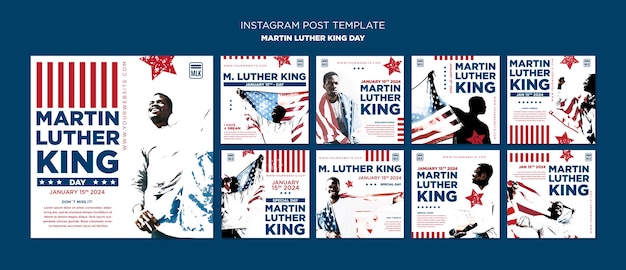

Martin Luther King Jr. was born on January 15, 1929, in Atlanta, Georgia.
He was a prominent leader in the Civil Rights Movement in the United States.
King became the youngest person to receive the Nobel Peace Prize in 1964 for his nonviolent approach to racial equality.
Martin Luther King Jr. was a Baptist minister and believed in the power of peaceful protest.
He delivered his famous I Have a Dream speech in 1963, calling for an end to racism and segregation.
King’s activism was inspired by Mahatma Gandhi’s approach to nonviolent resistance.
He played a key role in the Montgomery bus boycott, which ultimately led to the desegregation of public transportation.
Martin Luther King Jr. advocated for voting rights for African Americans, leading to the passing of the Voting Rights Act in 1965.
His leadership and dedication to the Civil Rights Movement helped bring about significant changes in the legislation and societal attitudes towards racial equality.
King organized peaceful protests and marches, including the historic Selma to Montgomery march for voting rights.
He founded the Southern Christian Leadership Conference (SCLC) in 1957 to mobilize African Americans in their fight for civil rights.
Martin Luther King Jr. believed in the importance of economic justice and fought for fair wages and working conditions for all.
King’s belief in nonviolence was challenged, but he remained committed to his principles, even in the face of hostility and violence.
He was arrested numerous times for his peaceful protests and acts of civil disobedience.
Martin Luther King Jr. was tragically assassinated on April 4, 1968, in Memphis, Tennessee.
His death sparked riots and protests across the country, highlighting how deeply he had impacted the African American community.
King’s legacy continues to inspire people around the world to fight for justice and equality.
He is remembered as a symbol of hope and perseverance in the face of adversity.
Martin Luther King Jr. received numerous awards and recognitions for his contributions to civil rights, including the Presidential Medal of Freedom.
Many cities and landmarks in the United States are named in honor of Martin Luther King Jr.
He graduated from Morehouse College with a Bachelor of Arts degree in sociology.
King studied theology at Crozer Theological Seminary and later earned his Ph.D. from Boston University.
He considered Jesus Christ, Mahatma Gandhi, and Abraham Lincoln to be his sources of inspiration.
Martin Luther King Jr. was married to Coretta Scott King, who also became an important figure in the Civil Rights Movement.
The Martin Luther King Jr. Memorial in Washington, D.C. features a 30-foot tall statue of King and quotes from his speeches.
King’s efforts, together with other civil rights leaders, led to the end of legal racial segregation in the United States.
He was posthumously awarded the Congressional Gold Medal and a U.S. national holiday in his honor.
Martin Luther King Jr.’s teachings and philosophy continue to be studied and analyzed by scholars around the world.
King believed in the power of love and reconciliation, even in the face of hatred and injustice.
He advocated for the rights of all marginalized groups, not just African Americans.
Martin Luther King Jr.’s vision extended beyond the borders of the United States and influenced other human rights movements globally.
He delivered over 2,500 speeches in his lifetime, spreading his message of equality and justice to diverse audiences.
King’s book Stride Toward Freedom: The Montgomery Story chronicles the events leading up to the Montgomery bus boycott.
He was opposed to the Vietnam War and spoke out against the injustice and immorality of the conflict.
Martin Luther King Jr.’s leadership and speeches helped shift public opinion and create momentum for change.
He advocated for the eradication of poverty and economic inequality, seeing them as deeply intertwined with racial discrimination.
King’s philosophy of nonviolence inspired other activists around the world, including Nelson Mandela in South Africa.
He emphasized the importance of education and believed in the transformative power of knowledge.
Martin Luther King Jr. was posthumously inducted into the International Civil Rights Walk of Fame in Atlanta.
He was a skilled orator and used his powerful voice to mobilize people towards social change.
King’s dedication to peace and justice continues to inspire new generations of activists.
He believed in the power of collective action and encouraged people to join together for a common cause.
Martin Luther King Jr.’s Letter from Birmingham Jail is considered one of the most important documents of the Civil Rights Movement.
He dreamt of a future where all individuals would be judged by the content of their character, not the color of their skin.
King’s influence on American society and the world at large cannot be overstated, as he remains an iconic figure in the fight for equality and justice.
Around the world, coffee enthusiasts enjoy Monin coffee concentrate since it is a multipurpose product. Conveniently combining…
The Importance of Choosing the Right Shower for Your Bathroom Renovating your bathroom can be…
Usain Bolt holds the record for the fastest 100-meter sprint in history.Bolt was named Sportsman…
Love is in the air... and it smells suspiciously like chocolate!Roses are red, violets are…
Life's a beach, take a picture and relax.Sun, sand, and salty kisses. That's what beach…
Hungary is home to the largest thermal water cave system in the world.The Rubik's Cube…